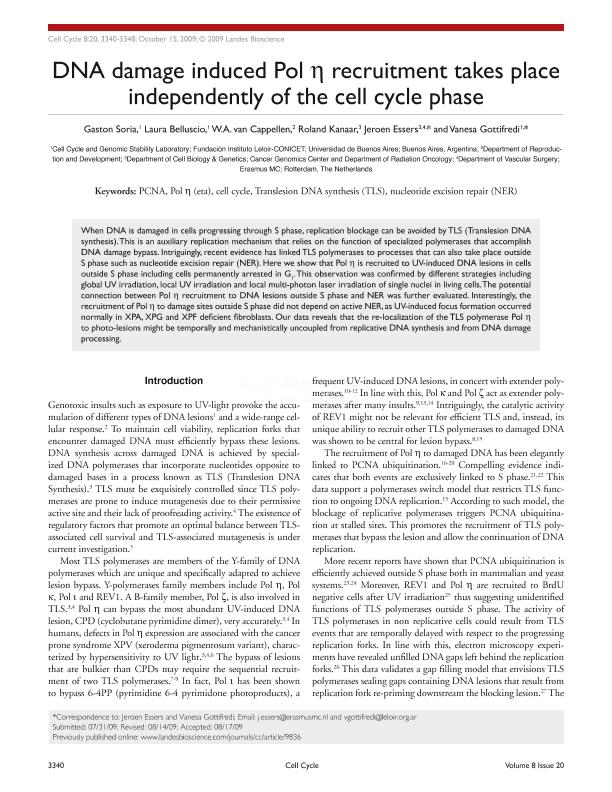Mostrar el registro sencillo del ítem
dc.contributor.author
Soria, Ramiro Gasto
dc.contributor.author
Belluscio, Laura María

dc.contributor.author
van Cappellen, W. A.
dc.contributor.author
Kanaar, Roland
dc.contributor.author
Essers, Jeroen
dc.contributor.author
Gottifredi, Vanesa

dc.date.available
2017-10-04T20:03:30Z
dc.date.issued
2009-10
dc.identifier.citation
Soria, Ramiro Gasto; Belluscio, Laura María; van Cappellen, W. A.; Kanaar, Roland; Essers, Jeroen; et al.; DNA damage induced Pol eta recruitment takes place independently of the cell cycle phase; Landes Bioscience; Cell Cycle; 8; 20; 10-2009; 3340-3348
dc.identifier.issn
1538-4101
dc.identifier.uri
http://hdl.handle.net/11336/25933
dc.description.abstract
When DNA is damaged in cells progressing through S phase, replication blockage can be avoided by TLS (Translesion DNA synthesis). This is an auxiliary replication mechanism that relies on the function of specialized polymerases that accomplish DNA damage bypass. Intriguingly, recent evidence has linked TLS polymerases to processes that can also take place outside S phase such as nucleotide excision repair (NER). Here we show that Pol eta is recruited to UV-induced DNA lesions in cells outside S phase including cells permanently arrested in G(1). This observation was confirmed by different strategies including global UV irradiation, local UV irradiation and local multi-photon laser irradiation of single nuclei in living cells. The potential connection between Pol eta recruitment to DNA lesions outside S phase and NER was further evaluated. Interestingly, the recruitment of Pol eta to damage sites outside S phase did not depend on active NER, as UV-induced focus formation occurred normally in XPA, XPG and XPF deficient fibroblasts. Our data reveals that the re-localization of the TLS polymerase Pol eta to photo-lesions might be temporally and mechanistically uncoupled from replicative DNA synthesis and from DNA damage processing.
dc.format
application/pdf
dc.language.iso
eng
dc.publisher
Landes Bioscience

dc.rights
info:eu-repo/semantics/openAccess
dc.rights.uri
https://creativecommons.org/licenses/by-nc-sa/2.5/ar/
dc.subject
Pcna
dc.subject
Pol H (Eta)
dc.subject
Cell Cycle
dc.subject
Tranlesion Dna Synthesis (Tls)
dc.subject
Nucleotide Excision Repair (Ner)
dc.subject.classification
Bioquímica y Biología Molecular

dc.subject.classification
Ciencias Biológicas

dc.subject.classification
CIENCIAS NATURALES Y EXACTAS

dc.title
DNA damage induced Pol eta recruitment takes place independently of the cell cycle phase
dc.type
info:eu-repo/semantics/article
dc.type
info:ar-repo/semantics/artículo
dc.type
info:eu-repo/semantics/publishedVersion
dc.date.updated
2017-09-28T18:14:40Z
dc.identifier.eissn
1551-4005
dc.journal.volume
8
dc.journal.number
20
dc.journal.pagination
3340-3348
dc.journal.pais
Estados Unidos

dc.journal.ciudad
Georgetown
dc.description.fil
Fil: Soria, Ramiro Gasto. Consejo Nacional de Investigaciones Científicas y Técnicas. Oficina de Coordinación Administrativa Parque Centenario. Instituto de Investigaciones Bioquímicas de Buenos Aires. Fundación Instituto Leloir. Instituto de Investigaciones Bioquímicas de Buenos Aires; Argentina. Universidad de Buenos Aires; Argentina
dc.description.fil
Fil: Belluscio, Laura María. Consejo Nacional de Investigaciones Científicas y Técnicas. Oficina de Coordinación Administrativa Parque Centenario. Instituto de Investigaciones Bioquímicas de Buenos Aires. Fundación Instituto Leloir. Instituto de Investigaciones Bioquímicas de Buenos Aires; Argentina. Universidad de Buenos Aires; Argentina
dc.description.fil
Fil: van Cappellen, W. A.. Erasmus MC; Países Bajos
dc.description.fil
Fil: Kanaar, Roland. Erasmus MC; Países Bajos
dc.description.fil
Fil: Essers, Jeroen. Erasmus MC; Países Bajos
dc.description.fil
Fil: Gottifredi, Vanesa. Consejo Nacional de Investigaciones Científicas y Técnicas. Oficina de Coordinación Administrativa Parque Centenario. Instituto de Investigaciones Bioquímicas de Buenos Aires. Fundación Instituto Leloir. Instituto de Investigaciones Bioquímicas de Buenos Aires; Argentina. Universidad de Buenos Aires; Argentina
dc.journal.title
Cell Cycle

dc.relation.alternativeid
info:eu-repo/semantics/altIdentifier/url/http://www.tandfonline.com/doi/abs/10.4161/cc.8.20.9836
dc.relation.alternativeid
info:eu-repo/semantics/altIdentifier/doi/http://dx.doi.org/10.4161/cc.8.20.9836
Archivos asociados
